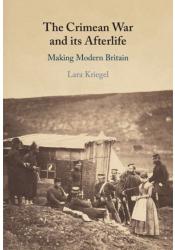The Crimean War and its Afterlife: Making Modern Britain by Lara Kriegel
Lara Kriegel published The Crimean War and its Afterlife: Making Modern Britain on February 2, 2022. She begins by explaining how the Crimean War has always been viewed and dismissed as a colossal embarrassment and something that is better to be forgotten. In writing this book, Lara Kriegel sets out to change the perspective that follows the Crimean War and bring it into a better light. Specifically, Kriegel wants to show how the war shaped modern Britain in its afterlife. She explains the idea of afterlife like this, “Afterlife is a notion that apprehends the reverberations of the conflict over the ages – its unfinished business and its unanticipated effects, its literary inheritances and its material residues, its structures of feeling and its unanswered questions. It captures the robust persistence of the Crimea’s legacies and the reinterpretation of its meanings across both time and space.” (4) This idea adds importance to the Crimean War already and drastically puts it into a new light. Where for so long, majority of people wrote off the Crimean War as something that had no effect anymore other than being avoidable, Kriegel sets out to explain how it has impacted the idea of Britain's national “self” greatly. “The Crimean War’s afterlife thus charts, tracks, and engages the major narratives of the modern British past. It recurs with the ebbs and flows of empire and with the waging of wars and the coming of peace. It accompanies the rise and fall of the welfare state and the making of the liberal self.” (5) She goes on to explain how this war had figures, beliefs, and ideals that massively impacted Britain. She talks about the key figures of Florence Nightingale and Mary Seacole, the Christian themes that arose from this, and so much more. So much of the independent and liberal self is the focus here. “Yet, in its afterlife, the Crimean War has not only served as a link to history; it has also provided ground for reinvention.” (11) This changed the way people looked at events, figures, etc. This doesn’t only impact the Victorian Era but today as well, and that is Kriegel’s point.
Kriegel traces the effect of the Crimean War into modern day. She shows how so much of Britain's identity can be traced back to an event like this. The closing lines of her introduction perfectly sets the stage for her points and the thesis of her book. “With its generative capacities and its shifting resonances, the Crimean War engaged publics of ordinary Britons again and again, shaping their understandings of self and of nationhood. These pages tell the story of that engagement, from Victorian times to Woodham-Smith’s time to our time.” (17)
This whole concept of afterlife implicates the direct causes and effects that can reverberate through time. Much in the same way, Ukraine and Russia have been dealing with the afterlife and reverberations of years of conflict, oppression, war, and history that have shaped both Russia and Ukraine identities in very different ways.
Works Cited
Kriegel, Lara. The Crimean War and Its Afterlife: Making Modern Britain. Cambridge University Press, 2022.
The National Archives. “Exhibitions & Learning Online - British Battles.” The National Archives, The National Archives, 10 Sept. 2004, https://www.nationalarchives.gov.uk/battles/crimea/.
Wrench, Ed. M. “The Lessons Of The Crimean War.” The British Medical Journal, vol. 2, no. 2012, 1899, pp. 205–08, http://www.jstor.org/stable/20261303. Accessed 26 Apr. 2022.

